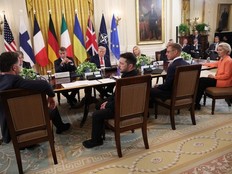GUNTER: Carney Liberals stubbornly holding onto EV lost cause

Article content
This week, the Carney Liberals announced they had no intention of changing the Trudeau government’s planned ban on gasoline-powered cars, trucks and vans beginning next year. Whether you want an EV, you’ll be forced to buy one if you buy any new vehicle by 2035.
This is the ideological equivalent of telling people who want a house they must by a condo, instead.
Recommended Videos
The federal government is stubbornly holding on to its EV mandate in the face of declining market demand for electrics.
Until the Carney Liberals choose not to build a new pipeline to the East Coast (which I expect them to announce in the next couple of years), this rigidity on EVs is the best proof yet that the Carney government differs very little from Justin Trudeau’s.
On Friday, Mercedes-Benz announced it was making a “course correction.” It was no longer committed to going fully electric by 2030. “Market conditions” (translation: lousy EV sales) were forcing it to “retain internal combustion engines longer than initially planned.” Mercedes will even continue to develop gas-powered and diesel engines.
Only days before, Audi had made a similar climbdown.
Honda, of course, announced last month it was suspending construction of $15 billion worth of EV plants in Ontario for at least two years. General Motors has shuttered its BrightDrop electric van plant in Ingersoll, Ont. And when it brings it back online this fall, GM plans to run the assembly line at half capacity or less.
Since the beginning of the year, Stellantis (Chrysler and Fiat) has shied away from producing large numbers of EVs, as have Volvo, Porsche, Ferrari and the subsidiaries of Volkswagen.
My favourite “course correction” comes from Ford which, after losing $5 billion on EVs last year, announced it would be converting a planned EV plant in Ontario to making its 10,000-pound (4,500-kilogram) F-250 SuperDuty pickup.
Canadians are buying giant pickups, not EVs.
And while politicians like federal Environment Minister Julie Dabrusin and Ontario Premier Doug Ford have blamed U.S. President Donald Trump’s tariffs for this dramatic dropoff (because both of their governments have gambled tens of billions on EV manufacturing), the truth is there isn’t a strong market for EVs in a country with vast distances and cold winters.
In case you don’t believe that carmakers can read the market signals, maybe you’ll believe Statistics Canada. Electric vehicles “represented only 8.7 per cent of all new vehicle sales in Canada in the first quarter of 2025 — a drop from 16.5 per cent in the fourth quarter of 2024.”
The biggest reason for the cliff-fall? In January, Ottawa ended its $5,000 per vehicle subsidies to EV buyers and Quebec reduced its $7,000 gift to $4,000 and announced its full phase-out by 2028.
According to StatsCan, over half of all EVs sold in Canada in 2024 were purchased in Quebec. Little wonder, since Quebec EV buyers qualified for a total of $12,000 in kickbacks from Ottawa and their province.
With those subsidies reduced to just $4,000 (and temporarily to $0 in February and March), StatsCan reported EV sales in Quebec fell by half in Q1.
Meanwhile, van sales rose nationwide by 23 per cent, pick up sales by 10 per cent and SUVs by three per cent.
But worry not eco-warriors, the federal Liberal government is going to try to recreate the fake market for all-electric vehicles using billions of additional tax dollars to chase the tens of billions they have already wasted on EV and EV battery plants.
Dabrusin promised Tuesday to restore the $5,000 Trudeau-era bribe to EV buyers and to spend tens of billions more (maybe more than $100 billion) building a network of charging stations at every spruce tree, inukshuk and roadside picnic shelter across this huge country.
No matter what the feds want to believe, there is no widespread market for EVs. Most EV buyers remain virtue-signalling rich people and enviro-activists.











Postmedia is committed to maintaining a lively but civil forum for discussion. Please keep comments relevant and respectful. Comments may take up to an hour to appear on the site. You will receive an email if there is a reply to your comment, an update to a thread you follow or if a user you follow comments. Visit our Community Guidelines for more information.